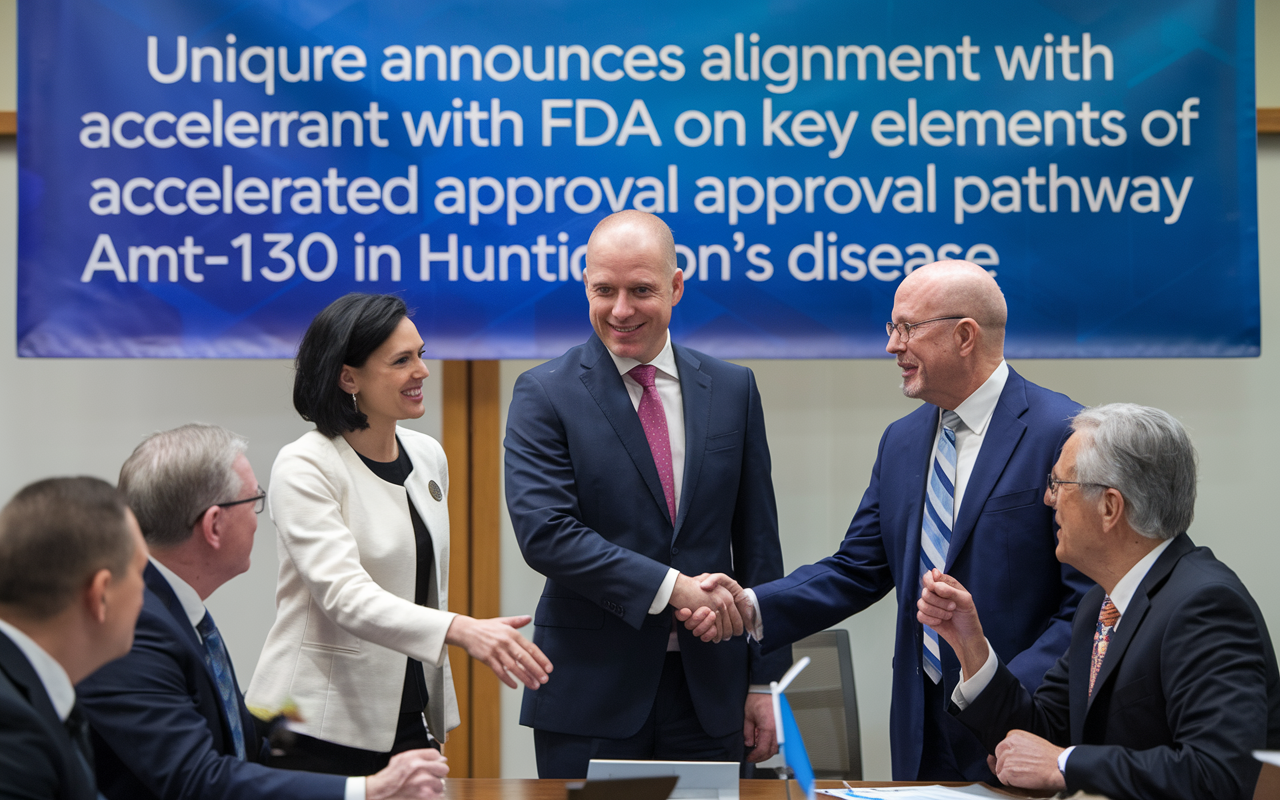Welcome BioPharmaPulse Readers
Welcome back to BioPharmaPulse! Today, we're diving into groundbreaking advancements that could reshape the future of biopharmaceuticals.
What's in this issue:
- 🧬 Discover how UniQure's gene therapy may accelerate Huntington's disease treatment
- ❤️ Learn about NewAmsterdam's unexpected cardiovascular findings
- 🧪 Explore BioNTech's promising bispecific antibody in breast cancer therapy
- 🚀 Find out why Eli Lilly is expanding its scope with obesity drug trials
Quote of the Day
"The future of medicine lies in understanding the mechanisms that underlie the diseases we seek to treat." - Dr. Francis Collins
Latest Developments
🧬 UniQure Announces Alignment with FDA on Accelerated Approval Pathway for AMT-130 in Huntington’s Disease (2 minute read)

Rundown: uniQure has reached alignment with the FDA on key elements for an accelerated approval pathway for its gene therapy, AMT-130, targeting Huntington's disease. This therapy is designed to inhibit the production of the mutant huntingtin protein, potentially slowing disease progression. Recent clinical trials have shown promising results in early-stage patients.
Keypoints
- 🧪 Innovative Gene Therapy: AMT-130 uses AAV vectors to deliver microRNA targeting mutant huntingtin.
- 💡 Accelerated Approval Pathway: The FDA agreed that ongoing trial data may support accelerated approval.
- 🩺 Significant Clinical Potential: Early trials indicate slowing of disease progression in Huntington's patients.
- 📈 Positive Regulatory Milestone: uniQure's stock soared over 120% following the FDA meeting.
Why it matters: Huntington's disease is a devastating genetic disorder with limited treatment options. An accelerated approval could bring this potentially transformative therapy to patients sooner, offering hope for improved quality of life and disease management.
❤️ NewAmsterdam's Cholesterol Drug Shows Unexpected Signs of Protecting the Heart in Latest Study (2 minute read)

Rundown: NewAmsterdam Pharma's experimental drug obicetrapib demonstrated significant LDL cholesterol reduction in a Phase 3 trial. Surprisingly, exploratory analysis also revealed a 21% reduction in cardiovascular events over a year, suggesting potential beyond cholesterol management.
Keypoints
- 💊 CETP Inhibitor Success: Obicetrapib lowers LDL cholesterol by 33% in patients with cardiovascular disease.
- 🔬 Cardiovascular Protection: Early signs of reduced cardiovascular events, sparking excitement.
- 🧪 Positive Safety Profile: Comparable adverse events to placebo, indicating good tolerability.
- 📊 Stock Surge: NewAmsterdam's shares rose by about 33% following the announcement.
Why it matters: Cardiovascular disease remains a leading cause of death globally. A drug that not only lowers LDL cholesterol but also reduces cardiovascular events could represent a major advancement in preventative cardiology, potentially benefiting millions of patients.
🧪 BioNTech Reports Phase 1b/2 Survival Data for VEGF Bispecific in Breast Cancer (1 minute read)

Rundown: BioNTech revealed early survival data from a mid-stage trial of its VEGF and PD-1 bispecific antibody, BNT-327, in treating advanced triple-negative breast cancer. The data suggests promising efficacy, potentially offering a new therapeutic avenue for this aggressive cancer type.
Keypoints
- 🧬 Innovative Bispecific Antibody: Targets both VEGF and PD-1 pathways to enhance anti-tumor response.
- 🌟 Promising Early Results: Improved survival outcomes in patients with advanced breast cancer.
- 🔄 New Treatment Options: Could provide an alternative to existing therapies like Keytruda.
- 🩺 Addresses Unmet Need: Triple-negative breast cancer has limited treatment options and poor prognosis.
Why it matters: Triple-negative breast cancer is challenging to treat due to its aggressive nature and lack of targeted therapies. BioNTech's bispecific antibody could represent a significant step forward, potentially improving survival rates and offering new hope to patients.
Question of the day
🤔 What potential impact could gene therapies like uniQure's AMT-130 have on treating genetic disorders?
- 💡 They could significantly slow disease progression
- 🛑 They might have minimal impact due to complexity
- ❓ It's too early to determine their effectiveness
Trending
🚀 Eli Lilly Plots $15B Share Buyback Plan
- Eli Lilly announces a $15 billion share buyback and increases its quarterly dividend by 15%, reflecting strong financial performance driven by its diabetes and obesity products.
💊 Eli Lilly to Start Testing Obesity Drugs as Treatments for Alcohol and Drug Abuse
- The company plans to study its obesity medications, including Zepbound, for potential use in treating addictions, exploring the broader therapeutic applications of GLP-1 drugs.
🧩 GSK Pens $45M Deal with AI Biotech to Identify Fibrotic, Osteoarthritis Targets
- GSK enters into a collaboration to leverage AI in discovering new drug targets for fibrotic diseases and osteoarthritis, highlighting the growing role of technology in drug development.
Industry Insight
🔬 The Rise of Bispecific Antibodies in Cancer Therapy
Bispecific antibodies are an emerging class of immunotherapies designed to bind two different antigens simultaneously. This dual-targeting approach can enhance therapeutic efficacy by bringing cancer cells and immune cells into closer proximity, boosting the immune response against tumors.
By learning about bispecific antibodies, you can appreciate how innovative strategies are being employed to tackle challenging cancers like triple-negative breast cancer. These therapies represent the next wave of precision medicine, offering hope for improved outcomes where traditional treatments have been limited.
Quick Hits
🧠 CervoMed's Ex-Vertex Drug Fails to Reduce Dementia Symptoms in Phase 2 Trial (1 minute read)
- CervoMed announced that its drug neflamapimod did not meet primary endpoints in a mid-stage trial for dementia, highlighting the ongoing challenges in neurodegenerative disease treatment.
💉 Novavax Initiates Phase 3 Trial for COVID-19-Influenza Combination Vaccine (1 minute read)
- Novavax begins a late-stage study on a combination vaccine targeting both COVID-19 and influenza, aiming to simplify immunization strategies for respiratory illnesses.
🌡️ CatalYm Shows Potential of Visugromab for Treating Cachexia (1 minute read)
- CatalYm presents promising data on visugromab, which may alleviate cancer-induced cachexia, a debilitating condition affecting patients' weight and muscle mass.
Wrap Up
That's it for today's BioPharmaPulse! It's exciting to witness such groundbreaking developments that hold promise for transforming patient care. Thank you for joining me on this journey through the latest in biopharmaceutical innovation.
Stay curious, stay informed, and feel free to share this newsletter with colleagues who share our passion for advancing healthcare.
Until next time,
Elliot Reeves | BioPharmaPulse
😊 How did you like today's email?
- 😍 Loved it
- 🙂 It was OK
- 😕 Could be better
